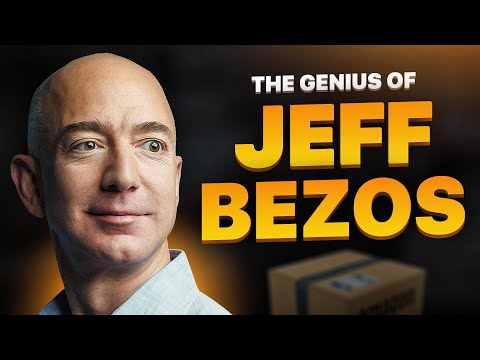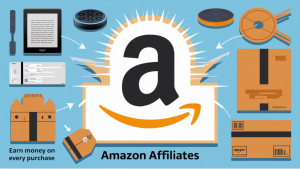
caption
Jeff Bezos: The Journey of a Visionary
In the world of business, certain names resonate as synonyms for success, innovation, and immense wealth. One such name is Jeff Bezos. He is not just the founder of Amazon, the company that revolutionized the way we buy and sell goods, but also a man who embodies the entrepreneurial spirit, a willingness to take risks, and a relentless pursuit of constant development.
Today, we will tell the story of Jeff Bezos, the man who turned a $300,000 loan from his parents into a multi-billion dollar empire. We will trace his journey from a humble garage startup to conquering space, peek behind the scenes of his business strategies, and understand the qualities that allowed him to become one of the wealthiest and most influential people on the planet. We will also delve into the scandals, his divorce, and his philanthropy. After all, Jeff Bezos’ life is full of not only dizzying highs but also unexpected twists and turns.
The Early Years
Jeff Bezos was born on January 12, 1964, in Albuquerque, New Mexico. His mother, Jackie Gise, was a teenager at the time of his birth, and his biological father, Ted Jorgensen, soon disappeared from their lives when Jeff was four years old. His mother married Cuban immigrant Miguel Bezos, who adopted the boy and gave him his last name. Jeff’s childhood was spent in Houston, Texas. It was his new father, Miguel Bezos, who instilled in Jeff a love of science and technology. As a teenager, he turned his parents’ garage into a laboratory where he conducted various experiments and built electronic devices. One vivid example of his ingenuity was a security system for his room, which included an alarm and homemade electric traps. This story perfectly illustrates not only his early interest in technology but also his desire for independence and protecting his interests.
Education and Early Career
After graduating from high school, Bezos enrolled at Princeton University, where he studied electrical engineering and computer science. It was at Princeton that a fateful encounter took place, which changed his life. Here, he met MacKenzie Tuttle, his future wife. They met in 1992 when MacKenzie was working at Princeton as a research assistant. Jeff was impressed by her intelligence and ambition, while MacKenzie was attracted to his energy and infectious laugh. Bezos graduated with honors in 1986 and began working on Wall Street in the field of information technology. Working in finance gave him valuable experience in data analysis and building complex systems. He quickly climbed the corporate ladder and soon became vice president of the investment company D.E. Shaw & Co.
Founding Amazon
In 1993, Jeff and MacKenzie married. Their marriage became not only a union of two loving people but also a partnership of like-minded individuals. MacKenzie always supported her husband’s ambitious plans and was ready to take risks alongside him. When Jeff decided to leave his prestigious job on Wall Street and start an online store, MacKenzie fully supported him despite the risks. Together, they moved to Seattle, where Jeff founded Amazon in the garage of their house. MacKenzie was one of the company’s first employees, handling accounting and other administrative tasks. In the following years, while Jeff built his empire, MacKenzie raised their four children—three sons and an adopted daughter from China.
The Beginnings of Amazon
Despite a successful career, Bezos felt that his calling lay elsewhere. He dreamed of creating his own business that would change the world. As he once said, “I couldn’t imagine being 80 years old and looking back on my life and thinking…” In the early 1990s, the internet was just beginning its triumphant march across the planet. Bezos, as a man with a sharp mind and a vision of the future, understood that this new technology held enormous potential. He studied statistics on the growth of internet users and was amazed by the pace of its development. Bezos analyzed various business models that could be implemented in the online space. He considered about 20 different categories of goods, including CDs, video cassettes, computer hardware, and even clothing. However, the idea of selling books online seemed particularly appealing to him. Books had several advantages: they were a standardized product, they were easy to store and ship, and there was a huge selection of books for every taste. Moreover, unlike clothes, which need to be tried on, or computers, which quickly become obsolete, books did not require physical inspection before purchase and had a long shelf life.
Amazon’s Early Challenges and Successes
Bezos shared his idea with the management of D.E. Shaw & Co., but they did not show much enthusiasm. Then he made a decision that many considered reckless. He quit his high-paying job and went to Seattle to start his own company. In 1994, Jeff Bezos, along with his wife MacKenzie, founded Cadabra Inc., which was later renamed Amazon. At the start, the company had only three employees, and the Bezos’ garage served as the office. To launch the business, Jeff borrowed $300,000 from his parents, which was a significant sum at the time. The first months of work were full of difficulties. They had to pack and ship orders themselves, work at night, and constantly improve the website. However, perseverance and belief in their idea paid off. Amazon quickly gained popularity thanks to its wide selection of books, low prices, and user-friendly interface. Just a month after launch, the company was selling books all over the United States and even in 45 other countries.
Expansion and Innovation
Amazon’s success in selling books was just the beginning. Bezos was not going to stop there and saw enormous potential in expanding the product range. In the late 1990s, Amazon began selling music and videos and then other goods such as electronics, clothing, toys, and much more. Bezos understood that in order to become a leader in online commerce, it was necessary to offer customers the widest possible selection of goods and services. He actively invested in the development of logistics infrastructure, creating huge warehouses and order processing centers. This allowed Amazon to significantly reduce delivery times and improve the quality of service.
Innovations and Breakthroughs
Jeff Bezos has always believed that innovation is the key to success. He constantly looked for new ways to improve Amazon’s service and offer customers something unique. One of Bezos’ revolutionary steps was the introduction of free shipping for large orders. This idea, which seemed risky to many, actually encouraged customers to buy more, which offset the shipping costs. Bezos also implemented a recommendation system based on previous purchases, which significantly improved the user experience and increased sales. These and other innovations, such as the Amazon Prime loyalty program, have become standard practice in e-commerce.
The Kindle and AWS
One of the most striking examples of Amazon’s innovation was the creation of the Kindle e-book reader. This device allowed people to read books in electronic format and ushered in a new era in publishing. Amazon also pioneered cloud computing with the launch of Amazon Web Services (AWS). AWS provides companies with access to powerful computing resources and allows them to significantly reduce IT infrastructure costs. This direction proved incredibly profitable for Amazon. By 2020, AWS generated more than 60% of the company’s operating profit, despite accounting for only about 12% of total revenue. This success not only strengthened Amazon’s financial position but also allowed the company to invest in new risky projects and innovations.
Amazon Prime: A Game Changer
In 2005, Amazon launched the Amazon Prime program, which offered customers free two-day shipping and other benefits for an annual subscription. This innovative idea was born out of Jeff Bezos’ desire to increase customer loyalty and purchase frequency. Initially, Amazon Prime was offered for $79 per year, which seemed like a risky move considering the potential shipping costs. However, Bezos believed that the convenience and speed of delivery would change customer behavior, and he was right. The program quickly gained popularity, and Amazon began expanding the range of services included in the subscription. In 2011, streaming video was added, making Amazon a competitor to Netflix. Later, music streaming, photo storage, early access to sales, and much more were added. This program became a real breakthrough and changed the habits of buyers. Amazon Prime provided people with convenience and time savings, making it one of the most popular subscription programs in the world.
The Financial Success of Prime
For Amazon, Prime proved to be an incredibly profitable project for several reasons. First, it significantly increased purchase frequency. Prime subscribers make purchases on average 2-3 times more often than regular customers. Second, the program significantly increased customer loyalty, significantly reducing churn as subscribers strive to “recoup” their subscription. In addition, Prime contributed to the growth of the average check; subscribers spend an average of 60% more than regular customers. The subscription model also provided Amazon with a stable stream of income that was not dependent on seasonal fluctuations in sales. Finally, Prime became a platform for promoting other Amazon services, such as Prime Video and Prime Music, creating synergy between the company’s various services. By 2020, the number of Amazon Prime subscribers exceeded 150 million worldwide. Analysts estimate the value of the Prime business at around $180 billion, making it one of Amazon’s most valuable assets. The success of Prime also allowed Amazon to invest in the development of its own logistics network, which further strengthened the company’s position in the e-commerce market.
Blue Origin: Reaching for the Stars
In 2000, Jeff Bezos took a step that seemed unexpected to many. He founded the company Blue Origin. This company became the embodiment of his long-held dream of space and a deep belief that the future of humanity lies beyond Earth. Since childhood, Bezos has been fascinated by the idea of space travel. He was inspired not only by science fiction novels but also by serious scientific concepts such as the ideas of physicist Gerard O’Neill about space colonies. Bezos believed that space exploration is not just an exciting adventure but also a necessity to solve global problems of humanity, such as resource depletion and overpopulation of the Earth. The creation of Blue Origin became for Bezos not just a business project but a life’s work. He personally participated in the development of rockets and spacecraft, investing billions of dollars of his own funds in the company. By 2021, his investment in Blue Origin exceeded $10 billion, which clearly demonstrates his commitment to this project.
Achievements and Future Plans
Over the years, Blue Origin has achieved significant success. The company developed the New Shepard rocket for suborbital tourist flights, the New Glenn launch vehicle for launching satellites into orbit, and the Blue Moon lunar lander. These developments not only advanced spaceflight technology but also opened up new opportunities for commercial space exploration. An important milestone in the history of Blue Origin and Bezos’ personal life was 2021 when he made a suborbital flight on the New Shepard rocket. This flight not only confirmed the operability of the company’s technologies but also demonstrated the seriousness of Bezos’ intentions in space exploration. Despite the fact that Blue Origin is not yet profitable, the company has already achieved significant success in the commercial sphere. It has received several contracts from NASA, including the development of technologies for the Artemis lunar program. In addition, Blue Origin has signed contracts to launch satellites for various commercial customers and has begun selling tickets for suborbital tourist flights.
The Bezos Divorce
In January 2019, Jeff and MacKenzie Bezos shocked the world by announcing their divorce after 25 years of marriage. This event attracted huge public attention not only because of the couple’s status but also because of the potential financial consequences given Jeff Bezos’ enormous wealth. The divorce process went surprisingly smoothly and quickly for such a complex case. In April 2019, an agreement was reached under which MacKenzie received 4% of Amazon shares, which at the time was about $38 billion. This divorce became one of the most expensive in history, instantly making MacKenzie one of the richest women in the world. Despite the divorce, both spouses showed maturity and mutual respect. They emphasized that they would remain friends and partners in their projects and raising children. This approach differed significantly from many high-profile divorces of celebrities and billionaires, often accompanied by scandals and legal battles.
Philanthropy Post-Divorce
After the divorce, both Jeff and MacKenzie significantly increased their charitable activities. MacKenzie Scott (formerly Bezos) shortly after the divorce signed the Giving Pledge, an initiative launched by Warren Buffett and Bill Gates, pledging to donate most of her wealth to charity during her lifetime or after death. She developed a unique approach to philanthropy characterized by quick, large donations without lengthy bureaucratic processes. Instead of creating her own foundation, MacKenzie prefers to donate directly to organizations she deems worthy. By 2023, MacKenzie has donated more than $14 billion to various organizations, including historically black colleges and universities, organizations fighting hunger, gender inequality, and racial injustice. Her approach is different in that she often makes unexpected donations to small organizations that do not usually receive large funding, thereby significantly increasing their impact and capabilities. MacKenzie also emphasizes the importance of transparency in philanthropy, regularly publishing information about her donations and encouraging other wealthy people to follow her example.
Controversies and Criticisms
Despite his impressive accomplishments, Jeff Bezos has repeatedly found himself at the center of scandals and has been subjected to harsh criticism. The main complaints against him boil down to three key aspects: market monopolization, working conditions at Amazon, and the company’s tax policy. Allegations of monopolizing the online commerce market are not unfounded. Amazon controls about 40% of the e-commerce market in the United States, which is causing concern among regulators. In 2020, the US House of Representatives conducted an investigation that revealed that Amazon used sales data from third-party sellers to develop its own competing products. Working conditions at Amazon also raise many questions. Warehouse workers complain about grueling production quotas, insufficient breaks, and constant monitoring of their activities. In 2021, the company was forced to publicly apologize for denying that its drivers sometimes have to urinate in bottles due to tight delivery schedules. Amazon’s tax policy has also been criticized. Despite huge profits, the company has long paid minimal taxes thanks to various benefits and loopholes in the law. In 2018, with a profit of $11 billion, Amazon paid no federal income tax. These problems did not go unnoticed by regulators. In 2021, the European Commission fined Amazon a record $886 million for violating data privacy rules in advertising. In the United States, the company is under close scrutiny by the Federal Trade Commission.
Response to Criticism
Bezos tries to respond to criticism by highlighting the positive impact of Amazon on the economy and society. He points to job creation, investment in innovation, and charitable initiatives. However, the debate about Amazon’s social responsibility and the ethics of its business model continues, remaining an important topic in the discussion of the role of large technology companies in the modern world.
Conclusion
Jeff Bezos is not just another billionaire but a true revolutionary in the world of business and technology. His unique journey from a humble online bookstore to creating the “everything store” Amazon has changed our understanding of shopping and delivery. Bezos brought to life an idea that seemed crazy to many: to make an online store profitable at a time when most people were still wary of online shopping. Bezos’ perseverance, his willingness to take risks, and his ability to see opportunities where others saw only obstacles made him a legend of Silicon Valley. His maniacal obsession with customer experience and innovation led to the creation of such revolutionary products as Amazon Prime and Alexa, which have become an integral part of the lives of millions of people.
But Bezos didn’t stop at Amazon. His passion for space and the creation of Blue Origin show that for him, there are no limits to the possible. He dreams not just of commercial space flights but of colonizing other planets to secure the future of humanity. The story of Jeff Bezos is not just a success story but also a story of contradictions. His business methods are controversial, but his impact on the modern world cannot be denied. Bezos has shown that entire industries can be changed if you have a vision and the determination to implement it.
Now, let’s think together. What mark do you think Jeff Bezos will leave on history? Will he be remembered as a visionary who changed the world for the better or as a ruthless capitalist who put profit above all else? Perhaps his legacy will be somewhere in between. Imagine yourself in Bezos’ shoes. How would you use his vast resources and influence? What global problems would you try to solve? Perhaps you would focus on fighting climate change, eradicating poverty, or developing education. Or maybe Bezos’ story inspired you to start your own business. What idea would you like to bring to life to change the world for the better? Share your thoughts in the comments below. Your opinion can inspire others and spark an interesting discussion. And, of course, if you enjoyed our video about Jeff Bezos, don’t forget to like and subscribe to our channel. We are preparing many more fascinating stories for you about people who are changing the world. Stay with us, and see you soon in the world of big business and innovation.







 Bengali
Bengali Chinese (Simplified)
Chinese (Simplified) English
English Hindi
Hindi Indonesian
Indonesian Irish
Irish Spanish
Spanish Swedish
Swedish Turkish
Turkish